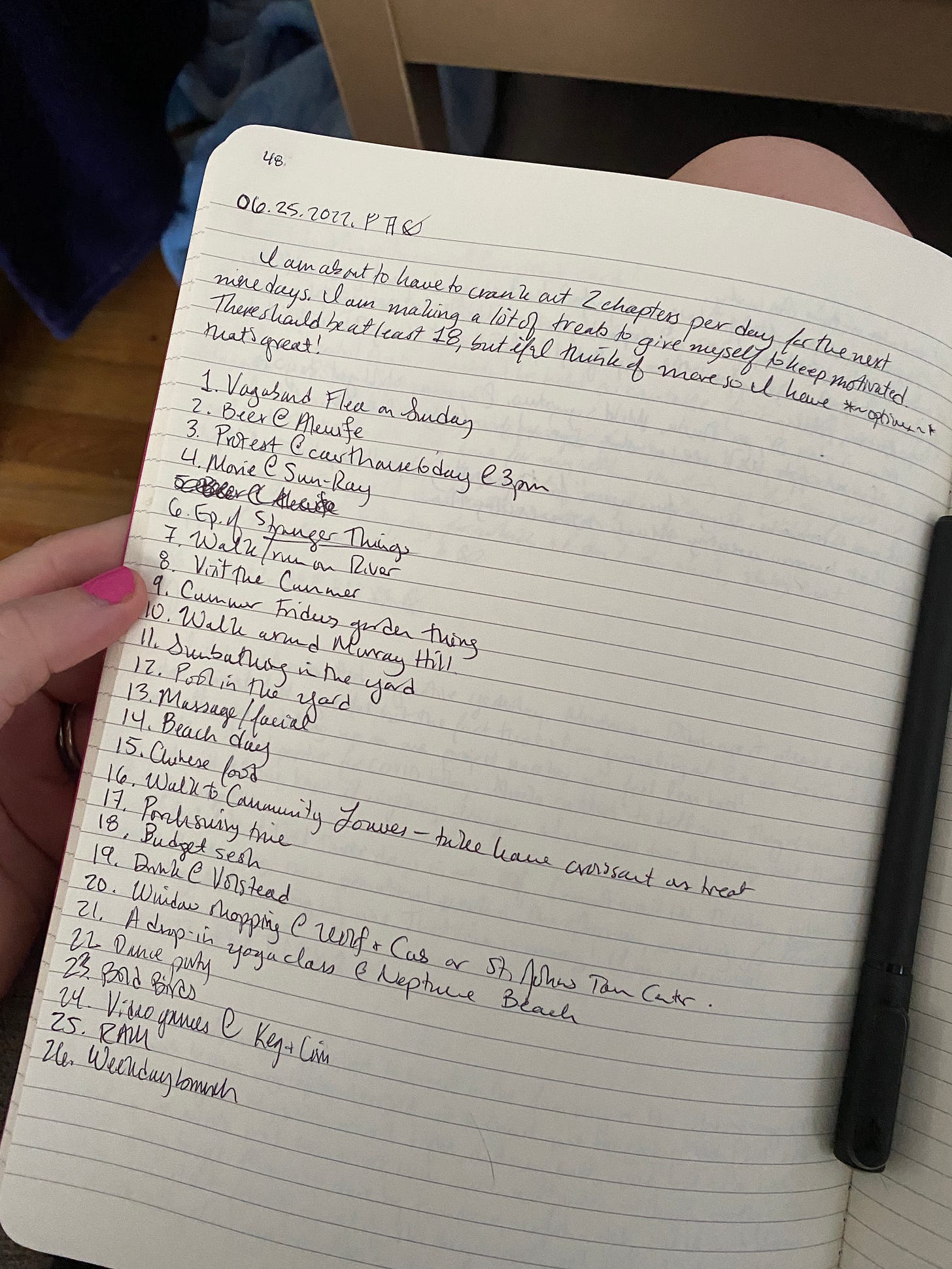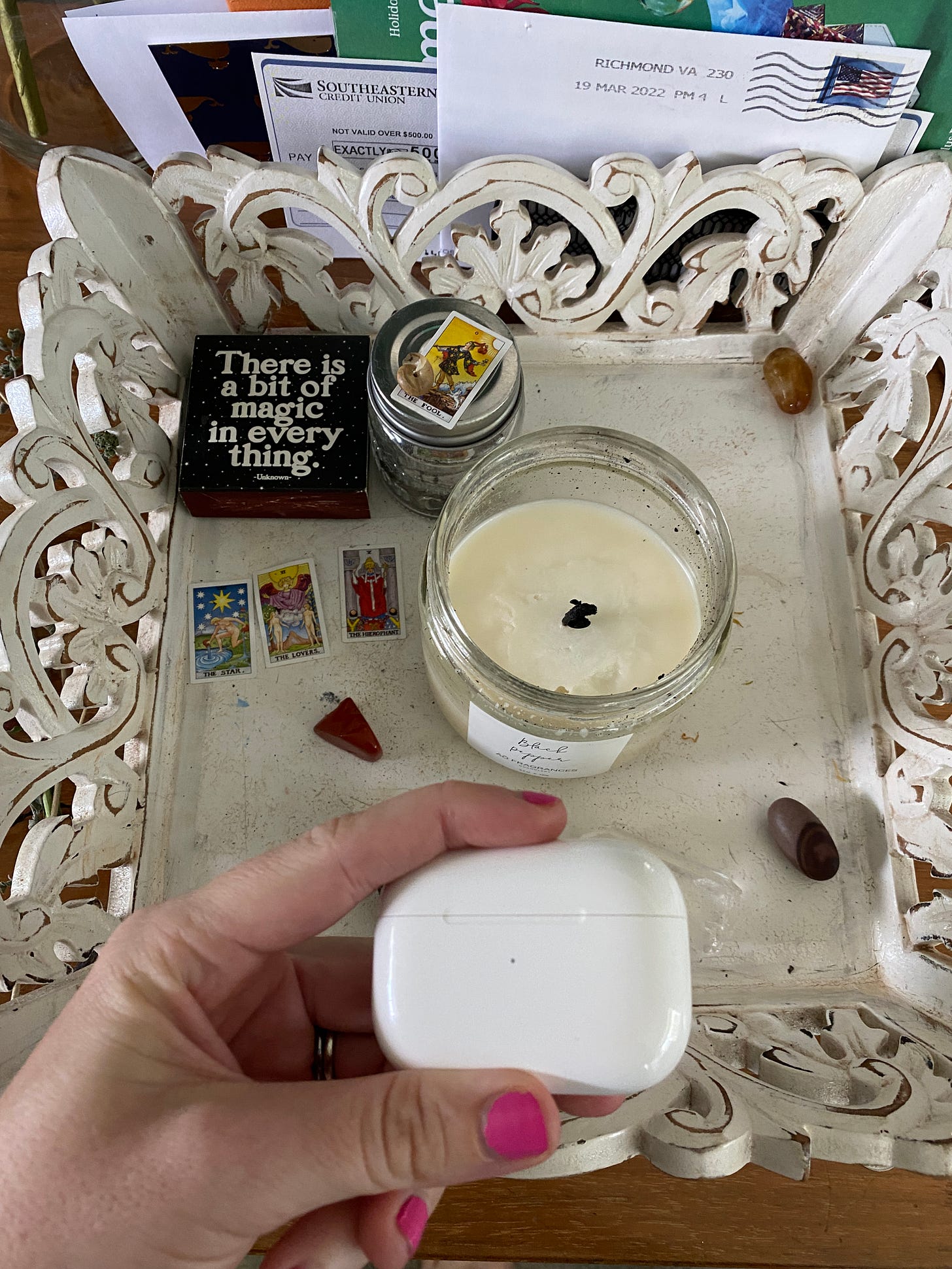How to Meet an Intensive Deadline Without Hating Yourself, or, How I Cranked Out ~50K Words in 9 Days
Take THAT, NaNoWriMo.
Jessica may receive affiliate income from some links below. (But with that headline in mind, don’t I kind of deserve it?)
Currently reading: The Ninth House, Leigh Bardugo; Refuse to be Done, Matt Bell
Currently watching: Great British Bake Off (WTF was that “Mexican Week” episode?)
Currently writing: My Big Fake Wedding has hit the shelves, debuting at #1 in American Humorous Lit on Amazon! I’m working on copy edits for my second novel, How to Keep a Husband for 10 Days, which is a fantastic segue into this installment of Left/Right…
The Scenario.
I fully understand if you read this headline and your first thought was, “Aca-scuse me?! Was Jessica doing 1970s Stephen King amounts of cocaine?”
No. No, I was not. And I would similarly be bowled over by the idea of cranking out most of a first draft over the course of nine days if I hadn’t lived it.
While my first book was already written and relatively polished when my publisher offered me a two-book deal earlier this year, my second book was still a gleam in someone’s eye. (Mine, apparently.)
I pitched the outline for How to Keep a Husband for 10 Days to my editor, honed it based on her initial feedback, and embarked on writing the damn thing between March and June…
…while editing my first book. (Normal.)
…while working as a full-time-and-then-some freelance editor, including for a very time-intensive months-long project. (Not ideal, but hey, it’s a living.)
…while chauffeuring my mom, who is disabled and for whom I am POA, to doctors’ appointments. (More time-intensive than it sounds.)
…while doing my best to emotionally support my husband and mother-in-law in the event of my father-in-law’s untimely death.
So, yeah, while I originally readily agreed to this timeline, it wound up not being ideal for a leisurely writing pace that culminated in handing over a polished draft. By the time I got to mid-June, only eight out of my twenty-six anticipated chapters were complete.
But you know what? Nevertheless, I persisted. #WarrenForPrez2024
I submitted my hot mess of a manuscript on July 3 as promised. I submitted it with the brunt of it, eighteen chapters, having been written in JUST NINE DAYS.* Best (and most surprising) of all, I did so without being sleep-deprived, without having sacrificed too much of consequence, and generally feeling more energetic than burned out.
* I am now realizing how much better of a publicity angle it would have been if I’d cranked out How to Keep a Husband for 10 Days… in ten days. Dammit.
How the F#@K Did I Do That?!
I’m so glad you asked, because that’s kind of the whole point of this article.
In case you’re up against (or are crazy enough to independently take on) a tight deadline, here’s my survival guide, which frankly didn’t exist back in the March—June period when I was blissfully unaware that I’d need it. Hopefully it’ll help you, too, glide near effortlessly past your own finish line (instead of crossing it and then pooping yourself like an Ironman triathlete 💩).
These six rules and two observations are all specific to my experience, though I’ve done my best to generalize at the end of each step so that it’s more helpful for you.
Rules 1 and 2 I anticipated needing. The others are ones I learned along the way.
Rule 1: Bribe Yourself.
To meet my contractual deadline, I would need to crank out two chapters a day for nine days straight.
Before I even began my marathon writing session, I knew that to get through such an intense period of productivity, I would have to treat myself the way I would a little kid I wanted to get to do something unpleasant, but with minimal kicking and screaming. Yes, I resorted to bribery.

I also knew from past experience that if I write for longer than three hours at a time, I exit the experience in a brain fog, feral and hungry. With this in mind, I decided to break up each day’s two chapters with the pattern of: Write a chapter, get a treat. Write a chapter, get a treat. The first treat was like an intermission, and the second one was a way to say, “Good job, self!” at the end of the day.
I wish I’d done a few more of my creatively fulfilling/restoring treats (e.g., going to an art museum), but those costs can rack up quickly. This is why I recommend that you, too, develop a list that includes both treats that cost money (e.g., dinner from your favorite restaurant, movie tickets) and free treats, like an at-home clay mask you already own and can enjoy while watching ten minutes of post-Roe coverage on CNN. (I sure know how to relax, huh? 😡)
Rule 2: Lean into Ritual.
I have an existing ritual I do every time I sit down to write, and I’ll get deeper into the psychology behind that in a future entry.
I amped it up a bit here. In addition to my cup of coffee, strength jar, and lit candle, I made sure to have a cozy blanket nearby; some stim toys, in case I needed to think or moderate my stimulus level; and my AirPods. (I know some people can write to music; I can’t. I like to use mine to cancel out outside noise. Sometimes even if I’m the only one at home save for the cats, the pressure of the AirPods against my inner ear helps me focus.)

Rule 3: Be OK with Crap.
Turns out that old Home Depot Dad phrase, “You can have it quick, you can have it cheap, or you can have it good,” is right.
No matter how well you’ve planned out this intensive period of productivity, you’re going to realize that parts of your outline are bogus, and you’re going to want to fix them. I had a few moments like this, and I’m here to tell you that there IS NO TIME TO GO BACK. At least not before your deadline.
As I continued writing, I realized I needed to be all right with my first, rough, slapdash draft being crap. If I wasn’t, I was going to waste precious time wringing my hands that what I’d drafted was “not very good”/“horrible.”
Well, yeah. It was.
But if you find yourself in my shoes, dust yourself off and say, “Today wasn’t the best thing I’ve ever written, but there’s always tomorrow.”
…and when tomorrow stinks, too—which it likely will, given how our stamina tends to flag the longer we’re in a marathon—you’ll just have to switch metaphors and remind yourself that you are like a sculptor. Right now you’re hauling a formless lump of stone out of the quarry. When you edit is when you’ll chisel its misshapen form into something glorious like the Winged Victory of Samothrace.
(NB: So that you don’t hobble yourself later by forgetting those editorial realizations about why the pivot from Act One to Act Two isn’t working just yet, I highly recommend keeping another document open in which you can chronicle them along with any ideas you get but don’t know how to work in at the moment.)
Hopefully, if the draft is going directly to any readers, like an editor or an agent, they also understand that it will be crap. My editor is a very kind and understanding soul who does understand this and who agreed to my neurotic but necessary request for two rounds of structural editing to account for it.
As she told me, being OK with crap can be a particularly difficult concept to digest if you’re in a similar two-book deal scenario to me, especially since your first book has been a polished manuscript in one form or another since before you began querying.
You cannot compare your second book to your first book. If you do, remind yourself of the hot little mess (💩) your first book was when you first victoriously typed “THE END.” This little book-a-doo racing against the clock will eventually be polished and lovely too. (One hopes.)
Rule 4: Clear Your Schedule (If Possible).
I knew that this intensely generative process was going to take a good deal of brain power and deep-work focus, so I cleared my schedule as best I could. For instance, I had a couple of editing projects I could not table during my race to my deadline, but otherwise, I had to be OK with letting my email inbox and other outstanding projects, which I could responsibly catch up on later, slide. If, like me, you’re self-employed, I find it helpful in these instances to set boundaries. Advise your clients ahead of time that you will be less accessible than usual.

On a related scheduling note, I decided not to have a set “at my writing desk” time each day. It was already enough that I was tearing through this draft at breakneck speed. If I had set butt-in-seat hours and broken them on top of it, I would have felt like a failure and may have wasted time spiraling instead of writing.
With this in mind, I didn’t sleep in, per se, but I went to sleep when I went to sleep, then woke up eight hours later. After allowing myself to enjoy the LA Times crossword over breakfast, I got to work.
You may be thinking this sounds like a total slouch move, but over the last couple of years, I’ve realized matching society’s ideas of productivity is a surefire way toward burnout. Making these accommodations for myself was critical because sleep deprivation is my go-to way to get stressed out.
You may be able to subsist on less sleep, or you may have a better morning routine in place than I do. Also, if you aren’t self-employed, it’s highly unlikely that you can take a week off work at the drop of a hat. This is why I say clear your schedule as best you can. If you know you can’t take off work at the drop of a hat, consider preemptively requesting paid time off around the time your deadline will come up. (Best case scenario, you’re already done with the draft? Get a free vacation thanks to your forethought!) Then clear your social calendar so that you’re getting writing done before and/or after work and not doing much else. (Aside from the treat-getting, of course.)
Rule 5: HYDRATE.
(Honestly, this is just good life advice, but you can’t be creative, much less creatively generative, if you’re running a low-grade dehydration headache.)
Rule 6: Write What You Know.
If ever there was a time for “write what you know,” it’s writing against a deadline, screaming all the way. I had a Very Pressing Deadline and two main characters who needed to be in an argument until they weren’t, so, dear reader, I confess to drawing inspiration from arguments my husband and I have had in the past. (With his permission, of course.)
Keep in mind that there will be a revision period. That’s the time to change things in creative and specific ways that make your book humorous, scary, suspenseful, emotionally compelling. (In my case, injecting an argument about having kids into the novel when my husband and I are childless by choice.) Right now, you’re just building out the template. Later, you’ll make it all more unique.
So yeah. That’s it.
With those six rules, I somehow managed to write eighteen chapters, approximately 50,000 words, in nine days. (SUCK ON THAT, NANOWRIMO.) Here’s a recap of my rules, if you need them:
Bribe Yourself.
Lean into Ritual.
Be OK with Crap.
Clear Your Schedule (If Possible).
Hydrate.
Write What You Know.
Though I made up these rules on the fly, the intervening months since I wrote against deadline have allowed me to process and come to the following two observations.
Observation the First: I Am NEVER Cranking Out a Novel in Nine Days EVER Again.
You may be wondering why I agreed to this breakneck deadline in the first place. It was indeed a grueling production schedule, and my publisher had their reasons. However, all things considered, I think that I could have advocated for myself and tried to push out the Book 2, Draft 1 deadline a bit more.
But hey! I did advocate for two rounds of structural edits as a result of this tight timeline, and that has made the novel (now in copy edits, forthcoming February 2023) much better. I’m taking this whole debut author thing as I should, with an open Beginner’s Mind, and realizations after the fact are no reason for regret. They are merely lessons to file away for another day.
Observation the Second: Book In Some Self-Care After You’re Done.
No matter how kindly you’re treating yourself, you’re going to get toward the end of this period and feel creatively knackered.
Matt Bell has a phrase I love: “art time/lived time.” He uses it to refer to the period after you finish the draft of a novel when you shouldn’t touch it at all. Instead you should focus on lived experience and on consuming other works of art, film, music, and literature that you enjoy.
Your impulse may be to dive right into whatever short story, companion essay, or other book project is next on your docket. Don’t. Take however long feels right and however long your production schedule allows to step away from intense writing work. Do some writing play, if anything. (I personally enjoy reading a new craft book as a palate cleanser.)
Soooo, yeah! That’s how I did this, and I guess how I reminded myself that humans can get used to pretty much anything.
Let me know in the comments section if you want a follow-up post on how I take notes when self-revising, which was a major piece of taking How to Keep a Husband for Ten Days from a crap-a-doo first draft entitled “On a Mission from God” to something I could be proud to put my name on.
XO,
Jessica
P.S. I realize that I’ve been radio silent for an absurd amount of time. Adding things like being a novelist to your daily and weekly schedule takes an adjustment period, but I’m pleased to say I’ve found a new normal, a balance that works for me. I’m going to be drilling down and focusing on this newsletter, with the biweekly publication schedule I promised you. Stay tuned and tell your friends to subscribe.


